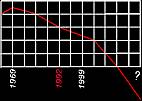keep up to date
for the latest developments around the refinery, please visit
the Circus
Why, Where, When
The Isla refinery was started by the Curaçaosche Petroleum Industrie Maatschappij CPIM, a Shell daughter, in 1918, to process oil from the Venezuelan Lake of Maracaïbo. At the same time, Standard Oil set up the Aruba Lago refinery. (The Venezuelan president preferred this over a power concentration around Maracaïbo.) After some ups and downs, the refinery got into high gear with World War II. The Allied forces in North Africa and the Allied air forces in Great Britain were supplied with oil products from Curaçao only. This resulted in a fabulous boom in economy and population. Many workers immigrated from other countries in the region. Curaçao harbor was in the top ten of the world qua tonnage.
The Isla refinery was located on an island in the Schottegat of Curaçao harbor. One result was heavy air pollution downwind and oil pollution in the three harbors and the adjoining coasts. It doesn't need explaining that the immigration wave, the visiting sailors and the American forces stationed on the island had an enormous influence on the sleepy, kind and tranquil island society.
After the Soldiers Went Home
In 1954 the Netherlands Antilles became autonomous with the Statuut. Just about then, Shell started automatisation of the refinery, and needed many less workers. The boom of WWII was over anyway. The economy was more or less saved by the so-called Off-Shore industry. This is not an industry
at all but exclusively run by accountants and such (often not even living in Curaçao), paying a token amount of tax here and so saving enormous amounts on their profits made elsewhere. All that, still enormous, tax income went to the government, which naturally expended to an enormous and inert body. But that's another story.
| Political Links |
Because refinery developments are so intricately, inextricably, intermingled
with our politics, to stay abreast of latest developments please visit our Circus:

(Use [Ctrl+F] there to find Isla) |
| Blame it on Shell |
Royal Shell, like KLM, was set up in a colonial era and behaved like it.
For example, wherever they had a refinery they housed their staff in villages of their own, surrounded by wire fences and with guards at the entrance gates. These kept the natives out effectively. You may well have needed this in Indonesia or Nigeria, but here it was just a waste of money. One result was that the Shell community was largely isolated from Curaçao society. They even ran their own bus lines.
Shell got the blame for a lot of things that were wrong, but it often remains a question if they were actually guilty. One example is the water problem. Because Shell needed enormous amounts of fresh water, they pumped up ground water and took measures to preserve rain. These measures tended to rape the landscape and were probably not very useful anyway. About the often-quoted report that Shell's pumping resulted in a lower level of ground water all over Curaçao, we have to think this is nonsense.
The island consists of over 200 separate rain catchment basins. All this water runs off to sea, eventually, be it surface or ground water. When you pump in one of those basin areas, you just pump water out of that one, not the one next to it. Let alone one on the other end of the island. The legend is based on a report on well levels all over the island, that were much lower than some years before. However, that survey had been made after a long dry period when water level would be low anyway.
Shell actively supported the community in social and cultural activities, and paid for the construction of several community buildings (like the C.C.C. Cultureel Centrum Curaçao, now in use by NAAM.) Overall, the period when Shell was operating here was, politically, the most stable and, economically, the most affluent Curaçao has ever known. That society was heavily disrupted by this sudden shock-transform of a small pre-industrial society to a much larger highly industrial one almost goes without saying. |

Exit Shell
In 1985 Shell announced the close-down of their Curaçao operation. For the grand total of 1 guilder, all their facilities were sold to the government which, predictably, panicked. PM Maria-Liberia Peters and George Hueck, a notoriously corrupt politician associated with FOL and Nelson Monte, proceeded to sell virtually all rights to Venezuela. National oil company PdVSA took over the refinery operations, putting up no guarantee and paying even less.
PdVSA really must have felt they had us suckers good. Whatever infamous amount of money they paid those two characters (just an insinuation - we can't know), it was well worth it. Just in that period, there was another one of the many oil crises looming up, and the Venezuelans discovered that having a supply of crude oil was not enough - you needed a refinery to guarantee a market. Within a year, Venezuela was busy buying refineries all over the world.
Meanwhile, they do pretty much as they like here. Maintenance is sloppy. While the Shell refinery during its top period was one of the safest in the world, since PdVSA took over they've had their share of fires, accidents and other mishaps.
The grapevine also has it that the refinery doesn't trouble to pay the rent, but with our transparent government
this is hard to check.

In 2006 Dutch Milieudefensie collected signatures
in an action "Stop Shell, join us"
"Use your profit to clean up your mess"
| Counting the Blessings |
| PdVSA pays a rent of $15M per year for the Isla refinery. That's it: PdVSA does not pay any land tax or land rent - no import duties - no sales or purchase tax - no profits tax. Nothing, except for that measly rent, which barely covers the .5G we will have to cough up in 2020 to demolish what will by then be left of the installations. In the 35 years since 1985, the total of rent paid then will be $525M.
|
More and more complaints are coming from the barrios downwind of the refinery. In spite of higher smoke stacks the air pollution seems to grow worse and worse, but our Milieudienst seems powerless or worse.
Shell Liability
or, when lawyers disagree
|
When Shell sold the refinery to Curaçao island, an explicit condition was that the oil giant did not accept any liability for any damages resulting from their operations. It was a bit surprising, then, that the Stichting Humanitaire Zorg [Humanitary Care Foundation] approached the Antillean Government in 2005 with a warning that all Shell's liabilities would expire on October 1, twenty years after the contract was signed. [But what liabilities?]
We did not learn about PM IJs' reaction before October 5, when newspaper Amigoe informed us that:
- IJs had referred the matter to the island government
- he mentioned how Shell had been granted a safeguarding against all liabilities
- he claimed Shell's liabilities would not expire before thirty (not twenty) years had passed.
All this information is so confusing and self-contradictory, only this seems sure - no consolation at all it seems very sure:
Shell will never have to answer to any liability they may, or may not, have
neither is the Antillean, nor the Curaçao government, willing or able to clean up the mess left behind
which will only get bigger before oil refinery operations finally, inevitably, grind to a definite halt |
Power and Money
A downright dangerous aspect of the Venezuelan take-over is the power Venezuela can exert over Curaçao. With the 1982 Falkland crisis, the Dutch immediately sent over a Navy squadron to keep Venezuela from getting any ideas.
If not for our relation with Holland, we'd already be completely in Venezuela's power. If they decide, because of a whim, to close down our refinery we're stuck. During the 2004 semi-revolution against president Chavez, the Venezuelan oil could be kept flowing to the USA only because of the enormous supplies available in Curaçao. Gasoline was even shipped back to Venezuela, so you may think they'd be cutting in their own flesh. But the old PdVSA staff later was largely fired by Chavez, and who knows what sort of bumbling fools he replaced them with? (Now the director of PdVSA is Chavez' full nephew, anyway.)
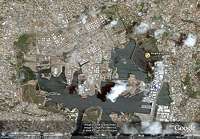
Google Earth Isla
Pollution vs Tourism
In the 1990s, the Curaçao government decided that the economic future of the island was Tourism. In this vision, they forgot that not very many tourists may care to visit a place that's still utterly dominated by a gigantic oil refinery. Unlike in Aruba, you just can't miss it. Then, a plume of smoke that reminds you of the German Ruhr Valley at its top extends for many miles over the sea, where you can enjoy looking at it from almost every beach.
After 2000, the population of the island began protesting mildly against all this. A 100m high smoke-stack was built (twice as high as the older ones - that, by the way, look like they're still in use, regardless) in the hope that the wind would carry the rubbish back to Venezuela where it came from. No such luck. It took until early 2005 before protests got serious enough to get some official reaction.
At the same time, the insight grew that the Schottegat, the inlet extending from Willemstad harbor where the refinery is located, would be a really fine tourist trap—if only there was no refinery. There is much more other industry around there than your median tourist would like to see, anyway, but removal of the refinery would go a long way. More arguments are that this would make us less dependant on Venezuela's caprices. What really started the discussion going was when in February of that year several schools had to send their pupils home because of refinery air pollution.
Two weeks later, Milieudienst announced that they (finally) had inspected the refinery. Many leaks had been found and fixed. Isla is even supposed to clean up the Schottegat crude oil pollution, which has been allowed to accumulate ever since CPIM started operations.
Wear and Tar
The problem seems to be that PdVSA is just exploiting the refinery, hardly investing in new equipment and only fixing defects that actually interfere with production. Duraco N.V., a company set up way back when by Royal Shell/C.P.I.M. for Isla refinery repair and maintenance work, went bankrupt in 2005 because there just was no more work forthcoming. Meanwhile, PdVSA is blackmailing the politicians with frightening threats to leave us if we become nasty.
After Chavez in 2004 put in mere nincompoops as replacements for 90% of PdVSA staff all bets are off: production has halved since then. That such a move might leave both Venezuela and us in an awkward position never really counts for politicians, not even, especially not, for dictators like Chavez. Look at all the stupidly short-sighted decisions Hitler made, digging his own grave (and, not incidentally, many more).
Refitting the refinery probably will turn out to so expensive it's not worth it. If it is, certainly the Antillean government can't afford it, let alone the island government. It looks like we would be dependant on PdVSA's fancy to have the refinery brought back up to date. If they don't we will even lack the money to demolish the works and can say good-bye to a large part of harbor activity as well, being left with one or two ships a week, if that, bringing tourists to have a look at the romantic ruins.
All this may, thus, finally lead to a stop of Isla refinery activities. This would effectively end all discussions, except those about colonialism
and independence
.
Royal Shell would never have given in to this sort of blackmail (knowing far too much about oil refineries, bribery and blackmail themselves.)The entire post-Shell history is yet another instance of
the clumsy impotence of our successive governments
in dealing with serious matters.
The Future of the Refinery
More Smoke Screens |
International energy consultants Purvin and Gertz, at the request of Curaçao island government, prepared a report on the future of Isla refinery. Their instructions, controversial to start with because no other tenders were invited and because Purvin and Gertz already are consultants for both Isla and PdVSA, were to study the technical state and future possibilities, including a preliminary budget for recommended adaptations.
All options were supposed to be looked at: To keep on running the refinery, to close it down or to continue in another form.
When in October 2005 their final report had been presented, there had been a change of government and FOL deputy Caldera, who himself formerly held an important maintenance function with the refinery, announced the results of the report would be kept secret, because too much company information would become public and it would endanger the strategic negotiation position . Refinery director Mensche also declared certain sensitivities would cause parts of the study being kept secret.
Apart from the question of how well this fits in the oft-proclaimed transparent government our leaders are so fond of going on about, Foundations SMOC and Humanitaire Zorg both are worried that this endangers the environmental and public health aspects related to the refinery's future. They might well be. So are we all.
|
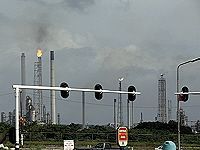
Good News? Or, Maybe...According to a report (May 2006) there's oil in the Caribbean Sea near Curaçao and Bonaire. Also near Aruba, but we knew that already. This, if true, blows all our chances of getting rid of the refinery in the near future. Our Leaders will be delighted, if not necessarily for exactly the same reasons that the news might be welcome to us. There's a fly in the ointment, though: 35% of the proceeds belong to the country (the Netherlands Antilles) against 65% to the islands of Curaçao and Bonaire.
If you are curious about the in-fighting that may result and the effects upon the independence wishes of the other islands now still part of that country, so are we.
Also the remark in the same report that exploitation cannot be allowed to harm the health of the population makes one think: Why should this make the present attitude change?
Note 2014-06-04: It has turned out to be absolutely impossible to find this "Report". We are still looking. Wouldn't be the first time we were lied to, nor the last, alas. Also quite possibly, the Report is kept secret because, according to several real experts, it could only state that there is no oil. So there.
Venezuela, which country surely must have been aware of the fact there was oil in them thar reefs long before we had the merest inkling, changed its tune immediately. Sure, PdVSA is now prepared to change the contract with the refinery all of a sudden. Yes, PdVSA is quite aware Isla refinery has to be renewed, and certainly would not mind sharing the cost! After all, that's only reasonable.
Beware:
They smell Crude Money.
But, as Vereniging Bedrijfsleven Curaçao stated, all this is very premature:
Is there any oil at all?
Another Oil War?
There is some seriously sounding talk about a possible war between the USA and Venezuela, all about oil. Several things are for sure: Apart from having elected Bush the Warmonger for president, the USA have been building Forward Operation bases (FOLs) with trimmings on Curaçao and Aruba; one seems not to be enough to protect two refineries (officially, they serve to combat the drug smuggling trade). Venezuela dictator Chávez, who'll be in power until 2015, is rumored to have ordered 200,000 assault rifles from China recently (and than some). In the fine old dictator tradition, he is telling the people they have a common enemy - in this case the USA, their principal customer. And we all know president Bush isn't exactly what you'd call a dove, either.
Wouldn't be the first time a war was started over oil, and this time going boom
might mean just that for us.
Between a rock and a Hard Place
The deal made by some politicians on leasing the Isla refinery to PdVSA, which left some of us wondering how much money had passed to whose hands, is getting ready to blow up in our faces like a volcano. A secret
report was leaked to Amigoe newspaper. Sparing you all the ugly details, this is what it all boils down to:
- The shutdown of Isla refinery, inevitable in the long run, costs $400M; this amount has to kept in reserve.
This is the least cost option.
Which option happens to be the absolute criterion Refineria di Korsow and Isla base their decisions on; as Norbert George was kind enough to remind me, we might do well to apply the same criterion.
- The financial position of owner Refineria di Korsow will become critical in 2011
- Isla needs to invest $1G or the plant will become obsolete in or before 2019
- Borrowing money is impossible: Installations cannot be used as security as PdVSA has all rights of use as leaser
- PdVSA will not be interested in buying - not with a lease contract expiring in 2019
- Selling Isla to a third party will result in a claim by PdVSA

Venezuela News and Views
Now Bestuurscollege wants to renegotiate the deal with PdVSA - but why would PdVSA want to? They're sitting pretty!
If you know a way out of this dilemma, you surely know more than our Leaders do. So, better watch PdVSA!
| PdVSA wants to renegotiate |
In June 2006, it turned out that PdVSA does want to renegotiate the lease, and extend it until after 2019. An $400M investment is necessary; not only to keep the refinery running, but also to reduce pollution and to improve the grade of its products. (This unexpected turn-around may also be inspired by enormous low-grade oil deposits in the Orinoco area for which more refining capacity will be needed.)
PdVSA feels the $400M should be shared, as the lease contract dictates, on a 50-50 base by them and Curaçao island, because this concerns pollution. However, as part of that amount will be spent for other purposes it is not at all clear if Curaçao really has to come up with half of it.
Another consideration is that Venezuela probably needs the Isla refinery more than ever in the future, so this is the time to try to make PdVSA change its tune. |
No surprise
It was no real surprise when PdVSA director suddenly reacted to several requests and even an ultimatum, to visit Curaçao for negotiations on the Isla refinery. The refinery is in deep trouble and, with a yearly inflation now over 10%, Chávez' arms build-up as if he were planning WW-III, and his oil sales at discount prices this can only grow worse. The new Orinoco oil fields need heavy extra refining capacity in the near future.
Granado figures an investment of 1.3G to 1.5G dollars for a technical upgrading and decreased pollution. PdVSA already has a concept agreement for a cooperation with Isla.
What is surprising is that only a few months ago PdVSA claimed they had no money at all for upgrading, and that somewhat later they offered a 50-50 deal on a 400M upgrade. As we remarked before, Curaçaos negotiating position must be much stronger than PdVSA lets on. Alas, with our bumbling politicians there's no hope they're able to use that advantage.
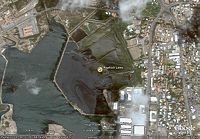
asphalt lake (Google Earth)
When Politicians Deliberate
Finally, in June 2006, our island government Bestuurscollege found the time to discuss this probably most important point for the future of Curaçao, independent or not. As was to be expected, the discussions were replete with interest. They all agreed we should try to make more money from the refinery; what took them so long?
SMOC may have had more influence than they could hope for. Deputy Davelaar stated that the refinery in its present polluting form has no right to exist; FOL member Carolina informed us how he recently learned from the SMOC court case that the refinery has caused illness and death. Where has the guy been all those years? His idea was, PdVSA should give us sports fields. Evertsz (not Mario, Dennis) proposed to replace the refinery fence with a wall and greenery.
At any rate, deputy Hernandez failed to give any answers. The 'delicacy of the negotiations' with PdVSA prohibited this. He said. He asked for a postponement until June 27. One thing he could confirm was, that when SMOC wins the case in court and the refinery has to shut down, PdVSA will sue the island for damages.
To put it in a nutshell, here are several options to continue Isla exploitation:
1. Clean up the refinery so it can go on processing by using higher-grade fuel; costs $165M.
2. Put extra scrubbers in the smoke stacks to catch SO2; $150M more.
3. Invest in new installations to produce a higher grade product; over $1G.
However, there are other options, not mentioned in the report. The most profitable solution, according to Purvin & Gertz, is to look for a financial partner; several are mentioned, among which Brazil's Petrobras and Trinidad's Petrotrin. Even Shell Oil is re-establishing a foothold in Venezuela; while possibly they may have changed their imperialist stripes, this does show up Chávez for the opportunist he is.
PdVSA has let it be known they lack the funds to invest $1G. Rather curious; but anyway, PdVSA financing this inevitably would result in Curaçao losing all such limited power over Isla it as yet still has. Once more, it is important to realize that P&G are also advisers for PdVSA, no doubt a very important customer, and their 'advice' should be taken with a sackful of salt. Especially since that most expensive option would prepare the refinery for processing the heavy crude Orinoco deposits.
| The Hard Facts? |
Purvin and Gertz reported before (Curaçao refinery Strategy Study, Valuation and Investment Alternatives that the value of the refinery was between $295M-490M. Not bloody exact, is it? Also, they did not consider the installations' condition too deeply, as the technical life-span is due to run out in the coming 4 years anyway; just stated that 'minimal investment' needed is $156M-303M, while an upgrading will cost at least $1.1G. (Such an upgrading would result in a minimum of 10 premature deaths in every of the coming 10 years.)
It seems Venezuela is willing to invest $1.5G in return for 49% of the Isla Refeneria di Korsou RdK shares. RdK seems not overly enthusiastic about this offer but suggests a third partner - like Shell, which PdVSA declines.
All this should have been discussed between Curaçao, RdK and PdVSA on December 14, but because of the Venezuelan elections that meeting was postponed. The idea now is it will take place next January.
All this according to Pierre in December 2006. Another taxation and evaluation has been contracted for by Curaçao by an as yet unknown company, rumored to be ABN-Amro Bank, also active in Cartagena-Colombia.
|
Another option
As the island government members have not read the Purving and Gertz report, Humanitaire Zorg plans to present them with a copy, so they will be informed for the next meeting (27 June 2006).
Humanitaire Zorg figures that selling Isla installations (~US$350M-500M) and Isla terrain (~US$500M) covers dismantling and rehabilitating the refinery plus renovating Curaçao Oil Terminal, and results in thousands of worker years. Presently there is 1 Isla worker per 4400 square meters (a soccer field).
In October 2006, after a Venezuelan delegation visit to Curaçao, PdVSA announced that they 'want to' invest ANG1.5G in the refinery and ANG400M in 'the environment'. On (at least) one condition: that PdVSA will become a shareholder in the refinery. They do not tell us how much of a share they expect to get in return. Pierrot is all for this ominous development.
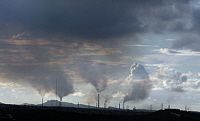
October 2006, no wind:
umbrella of smoke over Willemstad
| ANG28,000,000/year in damages |
This has been figured by consultant Ecorys on the government's request as the yearly damage caused by Isla. Ecorys remarks that their own report is not very reliable, as nobody even knows exactly what poisons Isla spreads; only CO2 and particles are taken into account. But Ecorys omits to consider hard results of solid earlier research.
Based on this one-sided and limited-vision report, government, Isla and Curoil have started to make prognostications on the future of the refinery and how much should be invested in it. This while Ecorys' report even disdains to look at the damages to infrastructure, private property, environment and nature; and the effects on tourism at Piscadera and Bluebay.
SMOC reacts that with this report a self-deceiving con-sell will be used as the base for long-term planning of which the next generations will be the culprits: If even with an US$1G investment today's pollution norms will not be met for the next 25 years, the barrios downwind of the refinery should be de-populated - this looks like the only way to comply with the judge's verdict.
|
| Venezuela and its Constitution |
After, in August 2006, the island government had unsuccessfully tried for a month to get a response from Venezuela on opening negotiations about the future of Isla refinery, the Antillean government had another fling at it. They expected Venezuela to lend this 'more important' institute its ear sooner; we're not so sure - very soon afterwards Venezuela energy minister Ramirez contacted island government. But an official response to the ultimatum was not forthcoming, so the Antillean government announced it would request Kindom minister Bot to approach Venezuela.
Another factor is that in the 1999 constitution Venezuela is required, in several indicated ways, to take care of the environment. Our government thinks this applies to PdVSA's operations here. We're even less sure about this. Judging from what's going on in Venezuela, these seem just empty phrases. As Humanitaire Zorg rightly comments, this is extremely hypocritical on our government's part, as we have similar commitments in our constitution without ever having taken proper action. They might add that it also is pretty sure to antagonize Venezuela before negotiations have even started, but that's exactly what we can expect from diplomatic politicians like ours. We do not have to be diplomatic, and point out that the way Chávez grabbed power degraded that same constitution to a farce.
On August 30, PdVSA vice-president announced he would come over for discussions. As was to be expected, Cova immediately claimed credit for this, as the man was 'a long time friend' of his.
|
Populism
In March 2006, the Curaçao Venezuelan consul announced that the deserving poor could have their eyes fixed in the Venezuelan Hospital Militar, all expenses paid. He would accompany them in person, on a free flight in a military - or even presidential - plane. (He does not seem to have much of more importance to do.)
The Curaçao eye quacks came out immediately with a statement that those same people could have their eyes fixed, free, right here; and that the island has the best eye care of the Caribbean. They also pointed at the dangers of having unknown entities operate on you.
Apart from all that, though it is true enough, everybody would prefer Venezuela to give us all a decent deal with our refinery. This is a mere propaganda stunt by which nobody really profits.
(For the record: Nothing more has been heard about this - nothing at all.) |
It is a reasonable assumption that in 2050
world oil reserves will be depleted
(that's only 13 elections away)
that is not necessarily a scenario of Doom to the World
but it does mean oil refineries will be finished before then




